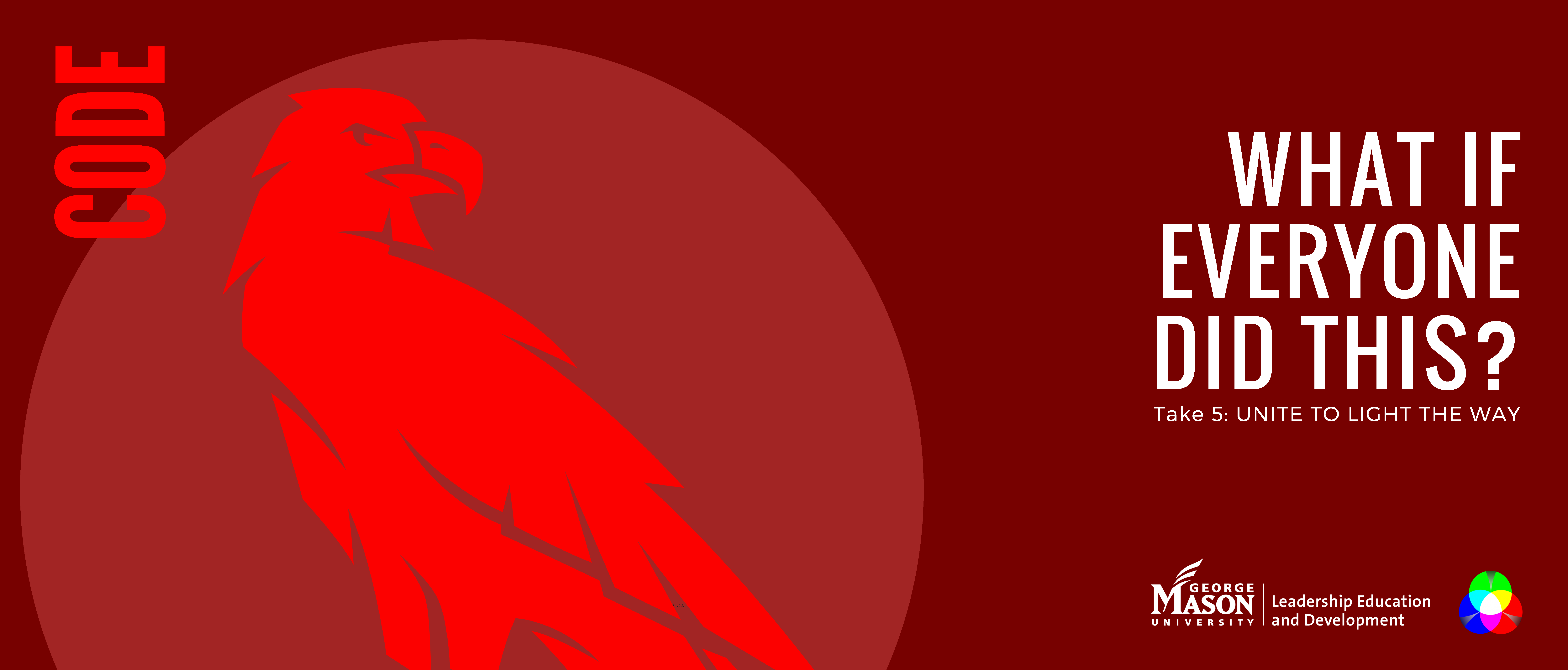

HADLEY the HAWK. Focus Color: RED
Why read the information below?
1. Have a tough decision to make? Explore the strengths and challenges of this decision-making focus.
2. Discover the benefits of uniting different focus areas (colors/animals).
3. Practically apply these resources to make better decisions individually, and in groups. For example: use the FREE Take5 card (take5.gmu.edu/ethics-card), request a workshop (email: [email protected]), etc.
Why a Hawk?
Hadley, like many hawks, is known for being very focused and for avoiding distractions. Hadley and people who prefer the Code Focus, aim their attention on the consistent principles that should guide our actions, as well as protecting people’s rights.
Why the color Red?
Red is one of the 3 primary colors of light, just as the Code focus is typically seen as one of the 3 primary ethical focus areas of Moral Philosophy. Imagine that we have three flashlights that we shine in a dark room. Each one shines a different primary color of light (green, red and blue). If we overlap these three primary colors of light we get white light, which is the full spectrum of visible light. Using visible light as a metaphor, we can combine the three primary ethical focus areas (Green for “Character“, Red for “Code“, Blue for “Consequences“) in much the same way that we combine visible light. By combining the three primary ethical focus areas (i.e., three primary colors) we can benefit from the strengths of different focus areas while balancing out the weaknesses of any single focus area.
Main Consideration:
When deciding what’s right Hadley, and others with a Code Focus, tend to believe that it’s best to stick to consistent principles or CODEs that should apply across situations, as opposed to focusing on personal characteristics or calculating the results of specific actions.
Question:
Like Hadley, someone with a Code Focus may ask themselves: “Would I want this action made into a rule/code for everyone to follow?” and “Am I respecting others rights and not just using them?” They believe in the importance of following reasonable and consistent rules/codes and protecting other’s rights, especially individuals or small groups who might be left out by others.
Strengths of the Code Focus:
1. INTENT MATTERS. Imagine that, through no fault of you own, you contract a deadly virus. You do not feel sick and you show no symptoms. You take the proper precautions, even though you don’t even know that you have the virus. You unintentionally spread the virus to 5 people, who end up infecting many others. This ultimately results in people dying. If you hadn’t contracted the virus, and unintentionally spread it to others, those people would still be alive. So, the consequences of the fact that you unintentionally spread the virus are terrible, but you had no idea and you were being safe and acting responsibly. Now imagine a 2nd person who purposefully tries to spread the virus to a few people that they don’t like, but it doesn’t work and no one dies. Whose actions were more unethical? According to the Hawk’s Code focus, the intent behind the action is very important to consider, regardless of the consequences. Here are 2 other examples: In sports (e.g. soccer, basketball) we distinguish between a foul committed by mistake and an “intentional foul”; Involuntary manslaughter (killing someone by mistake) is deemed less wrong than premeditated murder (killing someone on purpose). Some other focus areas (e.g. Wolf’s Consequences) focus on results. A strength of the Code focus is that it helps us to consider the intent of our actions (e.g. “what are we trying to do?”), not just what happens as a result.
2. PROTECTING RIGHTS. There is an attack in your community that many people believe was based on prejudice, and intolerance of difference. Many community members are extremely angry, and on the verge of rioting. No one knows who committed the attack and there is no good evidence. The situation is tearing your community apart. You are part of a council that is meeting to decide what to do. Some council members recommend finding a scapegoat (i.e., holding a random individual responsible) in order to prevent a riot where more people would surely get hurt. They argue that selecting one person to hold responsible would stop further violence. By taking a Code focus, you might say “We must not use someone, even if finding a scapegoat would prevent further violence.” Proponents of the Code focus argue that one of it’s strengths is that it can stop us from using a scapegoat (e.g., holding a random person responsible) just to end the conflict, even if a riot could be prevented and the overall consequences would be better (Note: other focus areas may see this as a challenge, not a strength). The Code focus helps us to consistently respect others’ rights (e.g. through consistent rules/codes for all) and not just use others. This helps to prevent rights violations of individuals or smaller groups (e.g. those in the minority).
Challenges of the Code Focus:
1. CODE CONFLICT. Let’s say that two of your most important rules/codes are: “Keep your promises” & “Help others when they need you.” Imagine that you promised to meet your friend Ali to help them prepare for a very important presentation that’s occurring the next day. On your way there you find out that a different friend, Beck, was just in an extremely upsetting argument with their romantic partner. Beck’s partner ended the conversation by breaking up with Beck. Beck says that they need your help right now- at the same time that you promised to help Ali with their important presentation. You feel that you can’t help them both in time. What should you do? You may wonder: “Should I keep my promise to Ali, or help Beck?” There are times when it is extremely difficult, or even impossible, to enact two conflicting codes. Which one should take precedence? You may say: “I would act based on how upset and fragile I think Beck is…” or “I would figure out how crucial Ali’s presentation is…”, but those would both be incorporating a different focus (e.g. Wolf’s Consequences). A Code focus doesn’t help us clarify what to do when two important rules/codes conflict. In these situations, it can help to see things from a different focus (e.g. Wolf’s Consequences Focus).
2. MORE THAN CODES. Imagine that you get really sick and have to go to the hospital. Your friend Hadley is able to safely visit you at the hospital. You are so happy to see Hadley and you ask “Why did you come to visit me?” Hadley strictly see things from a Code focus and says: “I asked myself ‘Would safely visiting a friend in the hospital be something I’d want everyone to follow?’ The answer was yes, so I determined that visiting you would be the right thing to do.” This seems very different to you than what your friend Olly said when visiting: “I’m here because you are my friend and I really like and care about you, of course I want to visit when you’re sick” (e.g. feelings of compassion). Hadley’s motivation seems a bit more calculated than Olly’s. Olly’s motivation seems to include more of an emotional connection: friendship, love, compassion. It can be argued that living an ethical life involves more than codes/duty alone. It could help Hadley to focus on the type of person they want to be (Otter’s Character), not just on the codes that everyone should logically follow. Furthermore, there are times when we may have good intent, but the impact of our actions turn out to be bad. For example, Hadley, intending to show to a person of color that they care most about personal characteristics, says “I don’t see color. We are all the same.” The person of color is hurt because it ignores something very important about them and their experiences. Hadley’s intent was good, but the result could have been a lot better. So, it can be essential to consider consequences (Wolf’s Consequences), not just intent (Hawk’s Code).
Theoretical Background:
Deontological Ethics (based on the wisdom of philosopher Immanuel Kant, and others).
Conclusion:
Hadley the Hawk represents a very important and respected focus area (CODE) from moral philosophy. However, it does not include everything. To balance out the challenges above, Hawk’s CODE should be combined with other focus areas like Otter’s CHARACTER and Wolf’s CONSEQUENCES. Combining focus areas is called PLURALISM and can be very beneficial.
Next Steps:
1. Remind yourself of the strengths and challenges of your main focus animal/color. This can help you anticipate benefits and identify potential problems down the road. For example, if you only focus on the Golden Rule (Bear’s Care focus: yellow/gold), you may not hold someone accountable for their behavior because you would not want to be held accountable if you were in their situation.
2. Pick at least one other focus area (another animal/color) to read more about (see take5.gmu.edu/animals/). This can help you better understand the strengths and challenges of different decision-making strategies and help you see the benefits of uniting the focus areas (“Unite to light the way”) since they can counteract each other’s challenges.
3. Use the Take5 card (take5.gmu.edu/ethics-card/) to help you make well-balanced decisions (individually or in groups). Print it out or email [email protected] to request a card. Research shows that we all need reminders to make more ethical decisions.
4. Request a workshop. Email [email protected] to request a workshop to better understand these resources.
Handout:
To better understand this focus area, see the PDF Handout.
Overall Conclusion about the focus areas of the animals:
The Otter, Hawk, Wolf, Bear and Elephant represent very respected views from moral philosophy. We recommend combining the views of these 5 animals to balance out their strengths and weaknesses. For some tips on how to do this, please see the ethicspectrum page.
For George Mason University community members who would like to learn more, the Center for Leadership and Intercultural Engagement (CLIE) offers workshops and other programs on ethics and leadership topics. The workshop that directly addresses the ethics and leadership topics discussed on this website is called: “What Would You Do? Making Tough Ethical Choices.” Please see our general page at lead.gmu.edu or our workshop request page.

